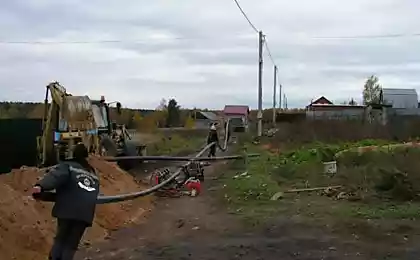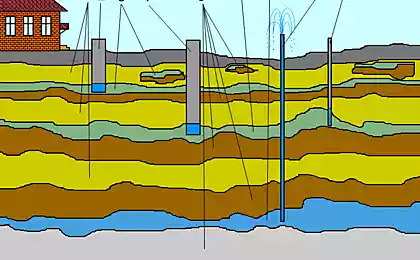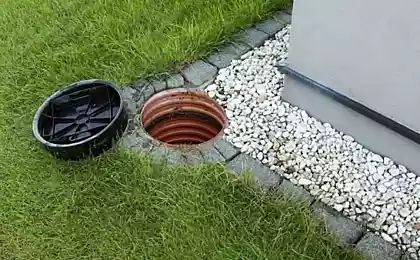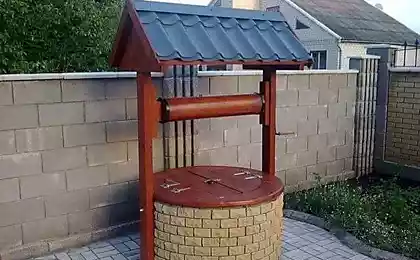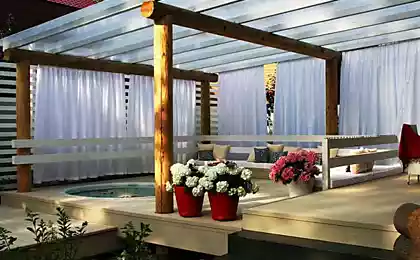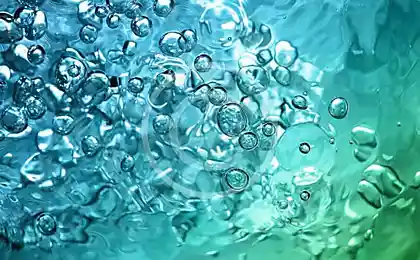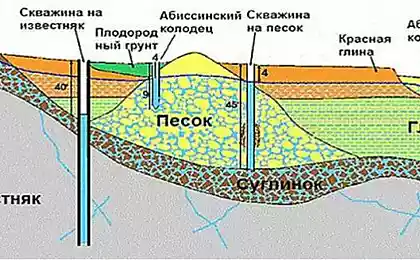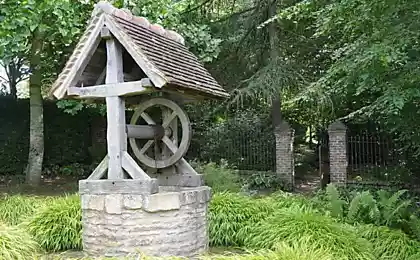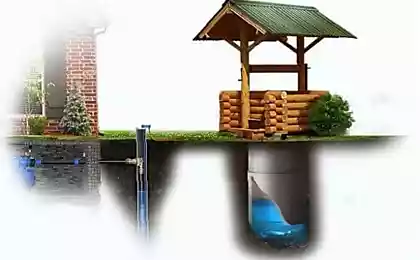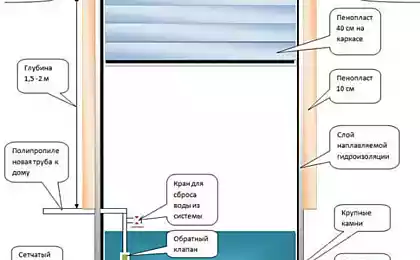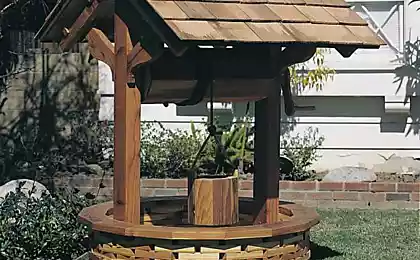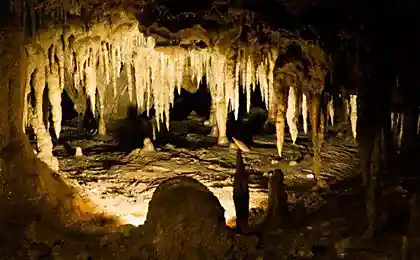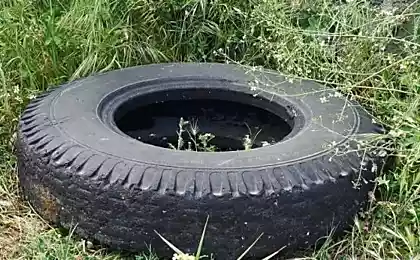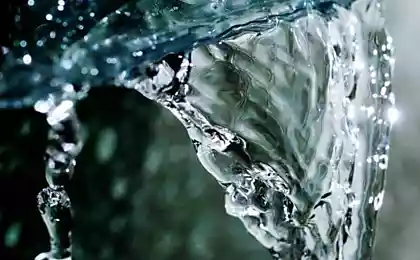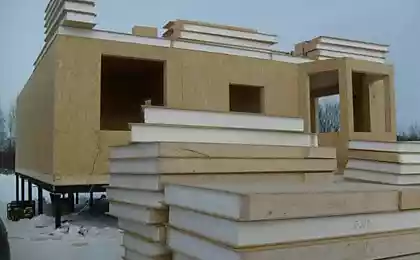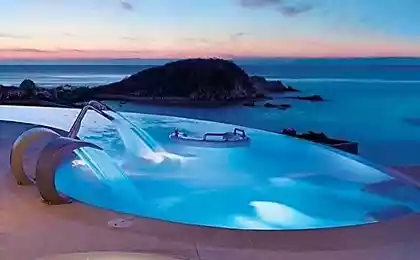503
Water supply in the country: the borehole or well?
But what is best for you? How not to get lost in the variety of types of wells and boreholes and choose the option that is best suited for features of the site? Let's face it.
What happens to the waterBefore building a well or boring with a, it is necessary to know something about water-about how water flows underground. There are three types of groundwater.
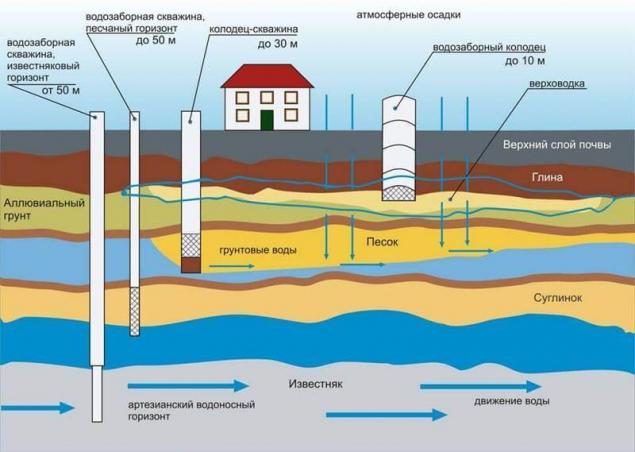
Located very close to the surface water, the so — called perched. This layer of water lies not more than four feet deep in the soil and collects moisture from rain and melting snow. This water is unfit for human food and for drinking, you can't use and for washing — linen will be more dirty than clean. And here is for watering the garden so water is the surest means. Therefore, the construction of a well with drinking water to protect it from contact with this water.
The middle layer is ground water. This, unlike perched, stable aquifer, the moisture in it is filtered via layers of soil, clay and sand. Such water most often occur in the well. Depth to groundwater varies up to 40 metres in depth. This moisture can be used for drinking, but only if additional filtering or boiling.
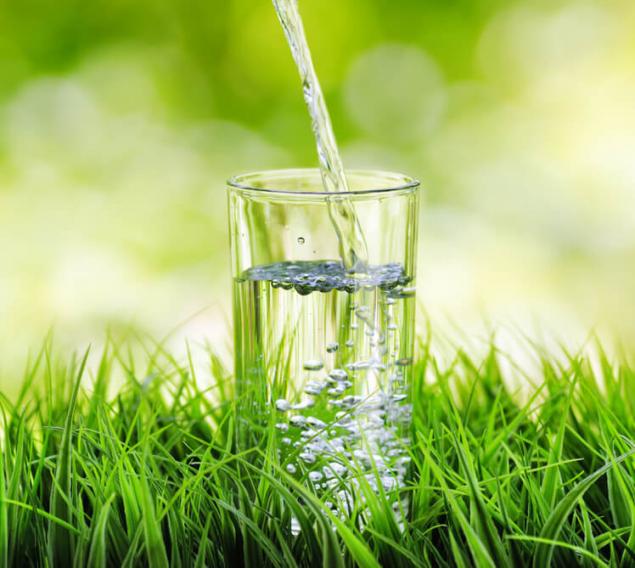
Artesian water is the deepest and the most pure and healthy form of groundwater. To obtain such water, must drill a well to a depth of 40-50 meters. Artesian water does not need additional purification before drinking, it also are full of minerals.
It should be noted that the depth of each layer waters on each site can be completely different, so even if your neighbor's dug well 20 meters deep, it is not necessary to use its measurements to create your own.
Types of wells and boreholes for self-drilling
Pros: low cost, stable water supply, ease of establishment, easy to clean, quite a long lifespan with proper care (about 50 years).
Cons: risk of water contamination by a layer of groundwater at the lack of integrity, little water intake, continuous monitoring of water as the purity and concentration of bacteria and fungi, periodic cleaning of the well and water disinfection.
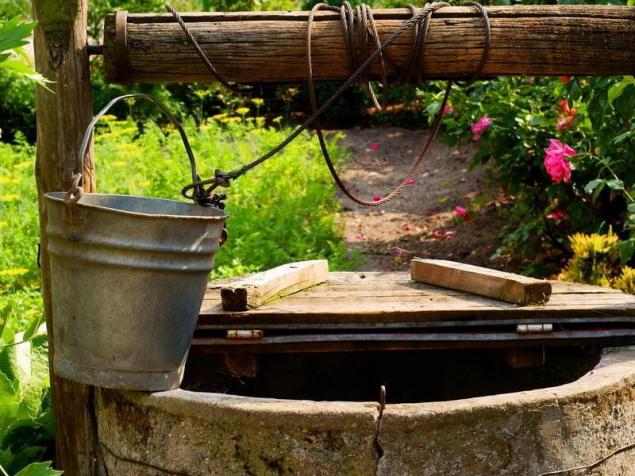
Abyssinian well (bore-needle)In fact, it is water from the same well, but in Abyssinian the well completely eliminated the risk of getting raised water due to its construction — a metal pipe hammered into the ground to a depth of 4 to 12 meters. The water rises through the pipe due to the installation of self priming pump.
Pros: indoor installation (in contrast to all other kinds of water), quickly built, leak-proof, large volume of water to be supplied, no need to clean the bore.
Cons: to create it is only possible in loose soil, the presence of a water layer not deeper than eight meters (otherwise the pump will not cope).
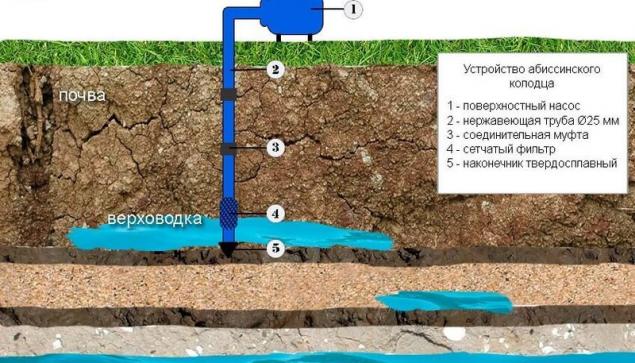
Filter wells (at the sand)the well is drilled to a depth of 30 meters. Manually to drill this layer of soil is almost impossible, so you'll have to incur the costs and to choose professionals for drilling wells. The professionals is a very important point, since the level of skills of the workers will depend on the life of the well (up to 15 years in best case).
Pros: more clean (relatively well) water, speed of drilling — a few hours, using a minimal set of equipment and tools during the installation, a small content of impurities and iron in the water.
Cons: when installing more than one well may reduce the pressure in winter is also likely to decline in pressure and amount of water, the depletion of the aquifer during regular use.
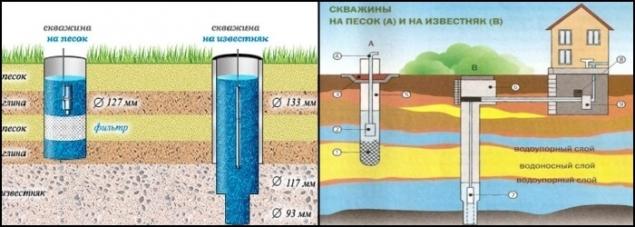
An artesian wellis the Most expensive, costly, but also the most reliable form of water supply for the city. The well is being drilled at a depth of 30-40 metres (the average depth of the well is about seventy meters deep into the soil). However, the purity of water and its characteristics make artesian wells a very popular option for water supply, for example, a country house or a street.
Pros: stable water supply, great opportunities and volumes of intake, clean and mineral rich water, the ability to connect multiple water intake points on one well without reducing pressure, long life — more than 50 years.
Cons: high cost of establishment, the need to obtain permits for groundwater abstraction by the relevant authorities, the high iron content in water, the need to use a powerful pump to lift water. published
P. S. And remember, only by changing their consumption — together we change the world! ©
Source: estp-blog.ru/rubrics/rid-29275/
What happens to the waterBefore building a well or boring with a, it is necessary to know something about water-about how water flows underground. There are three types of groundwater.

Located very close to the surface water, the so — called perched. This layer of water lies not more than four feet deep in the soil and collects moisture from rain and melting snow. This water is unfit for human food and for drinking, you can't use and for washing — linen will be more dirty than clean. And here is for watering the garden so water is the surest means. Therefore, the construction of a well with drinking water to protect it from contact with this water.
The middle layer is ground water. This, unlike perched, stable aquifer, the moisture in it is filtered via layers of soil, clay and sand. Such water most often occur in the well. Depth to groundwater varies up to 40 metres in depth. This moisture can be used for drinking, but only if additional filtering or boiling.

Artesian water is the deepest and the most pure and healthy form of groundwater. To obtain such water, must drill a well to a depth of 40-50 meters. Artesian water does not need additional purification before drinking, it also are full of minerals.
It should be noted that the depth of each layer waters on each site can be completely different, so even if your neighbor's dug well 20 meters deep, it is not necessary to use its measurements to create your own.
Types of wells and boreholes for self-drilling
- Classic all the familiar well;
- Abyssinian the well;
- Filter well;
- Artesian well.
Pros: low cost, stable water supply, ease of establishment, easy to clean, quite a long lifespan with proper care (about 50 years).
Cons: risk of water contamination by a layer of groundwater at the lack of integrity, little water intake, continuous monitoring of water as the purity and concentration of bacteria and fungi, periodic cleaning of the well and water disinfection.

Abyssinian well (bore-needle)In fact, it is water from the same well, but in Abyssinian the well completely eliminated the risk of getting raised water due to its construction — a metal pipe hammered into the ground to a depth of 4 to 12 meters. The water rises through the pipe due to the installation of self priming pump.
Pros: indoor installation (in contrast to all other kinds of water), quickly built, leak-proof, large volume of water to be supplied, no need to clean the bore.
Cons: to create it is only possible in loose soil, the presence of a water layer not deeper than eight meters (otherwise the pump will not cope).

Filter wells (at the sand)the well is drilled to a depth of 30 meters. Manually to drill this layer of soil is almost impossible, so you'll have to incur the costs and to choose professionals for drilling wells. The professionals is a very important point, since the level of skills of the workers will depend on the life of the well (up to 15 years in best case).
Pros: more clean (relatively well) water, speed of drilling — a few hours, using a minimal set of equipment and tools during the installation, a small content of impurities and iron in the water.
Cons: when installing more than one well may reduce the pressure in winter is also likely to decline in pressure and amount of water, the depletion of the aquifer during regular use.

An artesian wellis the Most expensive, costly, but also the most reliable form of water supply for the city. The well is being drilled at a depth of 30-40 metres (the average depth of the well is about seventy meters deep into the soil). However, the purity of water and its characteristics make artesian wells a very popular option for water supply, for example, a country house or a street.
Pros: stable water supply, great opportunities and volumes of intake, clean and mineral rich water, the ability to connect multiple water intake points on one well without reducing pressure, long life — more than 50 years.
Cons: high cost of establishment, the need to obtain permits for groundwater abstraction by the relevant authorities, the high iron content in water, the need to use a powerful pump to lift water. published
P. S. And remember, only by changing their consumption — together we change the world! ©
Source: estp-blog.ru/rubrics/rid-29275/
Stepfather and stepson: how to live together
Mercedes-Benz GLC in 2017 will be on hydrogen fuel cells
